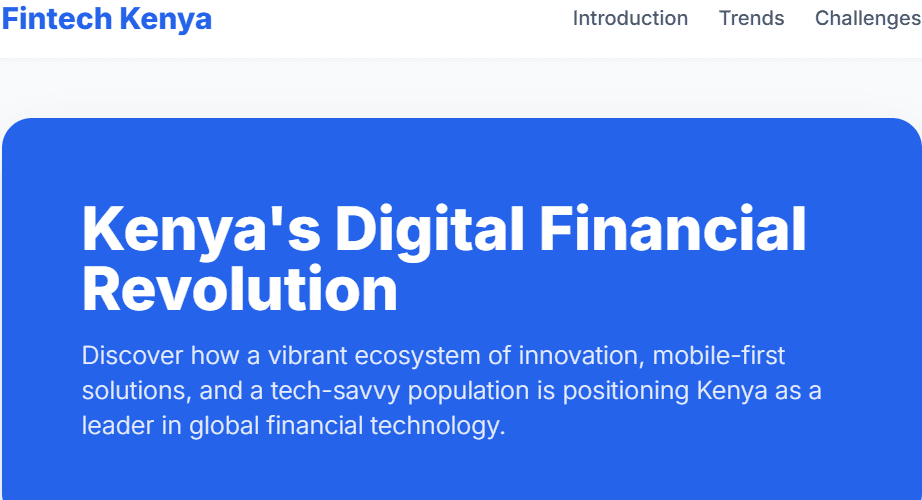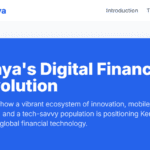Fintech Software Development Kenya:
- Delivery Time2 Weeks
- English levelProfessional
- LocationUSA, United Kingdom, United Arab Emirates, New York, Nairobi, Kilimani, Kenya, Dubai, CBD Nairobi, Canada, Australia
Service Description
The cost of Fintech Software Development in Kenya is 2200000KES .Get the cost of Fintech Software Development in Kenya at a price of 2000000KES at Black Shepherd Technologies.
Fintech Software Development in Kenya: Innovate with a Leading African Hub
We are a premier Fintech software development company in Kenya, specializing in building secure, scalable, and innovative financial solutions. Leverage our expertise in mobile payments, digital lending, Insurtech, and blockchain to drive your business forward in Africa’s most dynamic tech ecosystem. Partner with us to transform financial services with cutting-edge technology and a mobile-first approach.
Kenya has emerged as a global leader and a prominent hub for financial technology (Fintech) innovation in Africa, a reputation earned from a perfect storm of factors. The country’s “Silicon Savannah” is a thriving ecosystem fueled by widespread mobile phone penetration, a youthful and tech-savvy population, and a pressing need for financial inclusion. The success of M-Pesa, a pioneering mobile money service, laid a robust foundation for a dynamic and rapidly expanding Fintech landscape. This has created a significant demand for specialized software development, driving the growth of a skilled workforce and numerous companies dedicated to building cutting-edge financial solutions.
The Fintech software development sector in Kenya is not merely about creating digital versions of existing services; it’s about fundamentally reimagining how financial services are delivered. Developers are at the forefront of this transformation, building solutions that address the unique challenges and opportunities of the Kenyan and wider African markets. This includes developing mobile-first applications that are accessible to a large unbanked or underbanked population, creating robust and secure payment gateways, and leveraging emerging technologies to improve efficiency and reach.
Key areas of Fintech software development in Kenya include:
Mobile and Digital Payments: Building on the legacy of M-Pesa, developers are creating advanced mobile wallets, peer-to-peer (P2P) payment systems, and merchant payment solutions that facilitate seamless and secure transactions. This area is constantly evolving, with new platforms and integrations emerging to cater to the growing e-commerce and digital economy.
Digital Lending and Credit Scoring: Fintech companies are disrupting traditional lending by providing instant, mobile-based loans. Software developers are building sophisticated platforms that use alternative data sources, such as mobile usage and social media data, to create more inclusive and efficient credit scoring models, opening up access to credit for small businesses and individuals who lack a formal credit history.
Insurtech (Insurance Technology): The insurance sector is being revolutionized by technology. Developers are creating platforms that offer micro-insurance products, automate claims processing, and use data analytics to personalize insurance plans and premiums.
Regtech (Regulatory Technology): With an increasingly complex regulatory environment, software developers are building solutions that help Fintech companies and traditional financial institutions comply with regulations such as Know Your Customer (KYC) and Anti-Money Laundering (AML). These platforms automate compliance processes, reduce human error, and ensure adherence to legal standards.
Blockchain and Cryptocurrency: A nascent but growing area, Kenyan developers are exploring the potential of blockchain technology for secure record-keeping, transparent transactions, and decentralized financial services. This includes building platforms for cryptocurrency trading and exploring the use of distributed ledger technology for various financial applications.
The development process in Kenya is characterized by a strong focus on user experience (UX) and security. Given the high mobile penetration and the need for solutions that work on a variety of devices, a “mobile-first” approach is essential. Furthermore, with financial data at stake, robust cybersecurity measures, including encryption, two-factor authentication, and fraud detection systems, are a non-negotiable part of the development cycle.
The government and regulatory bodies, particularly the Central Bank of Kenya (CBK), have played a supportive role in fostering this innovation. The creation of regulatory sandboxes, for instance, allows Fintech companies to test new products in a controlled environment, ensuring that innovation can happen responsibly and securely. This collaborative approach between the private sector, regulators, and the tech community is a key driver of Kenya’s ongoing success in the Fintech space. As the country continues to invest in its digital infrastructure and talent, Fintech software development in Kenya is poised for even greater expansion, solidifying its position as a major player in the global Fintech arena.
Furthermore, the rise of open banking is a significant trend, allowing for a more interconnected and collaborative financial ecosystem. This approach, enabled by robust APIs (Application Programming Interfaces), allows Fintech firms to seamlessly integrate with traditional banks and other financial service providers. This fosters innovation and creates new opportunities for developers to build specialized services on top of existing infrastructure. For instance, developers are creating platforms that aggregate a user’s financial data from various sources, providing a holistic view of their finances and enabling better money management tools.
The rapid growth in this sector has also led to a specialization of skills. Software developers in Kenya are not just generalists; they are becoming experts in areas such as cybersecurity, data science, and cloud computing, which are essential for building secure and scalable Fintech platforms. This specialized talent pool is attracting international attention and investment, further solidifying Kenya’s position as a regional and continental tech leader. The development of new digital infrastructure, such as the government’s Digital Superhighway Project, which aims to lay 100,000 kilometers of fiber optic cable, will further accelerate this growth by improving connectivity and enabling more Kenyans to access these digital services.
Conclusion
Fintech software development in Kenya is a powerful engine of economic growth and financial inclusion. It is a sector defined by a unique combination of historical mobile money success, a forward-thinking regulatory environment, and a youthful, entrepreneurial talent pool. The developers are not just building applications; they are creating a new financial paradigm that is more accessible, efficient, and tailored to the needs of the African market. With continued investment in infrastructure, a supportive policy framework, and a focus on cutting-edge technologies like AI and open banking, Kenya’s “Silicon Savannah” is set to maintain its leadership, driving innovation that not only serves its own population but also offers scalable models for the rest of the world. The future of finance is being coded in Kenya, and its impact is only just beginning to be felt globally.








